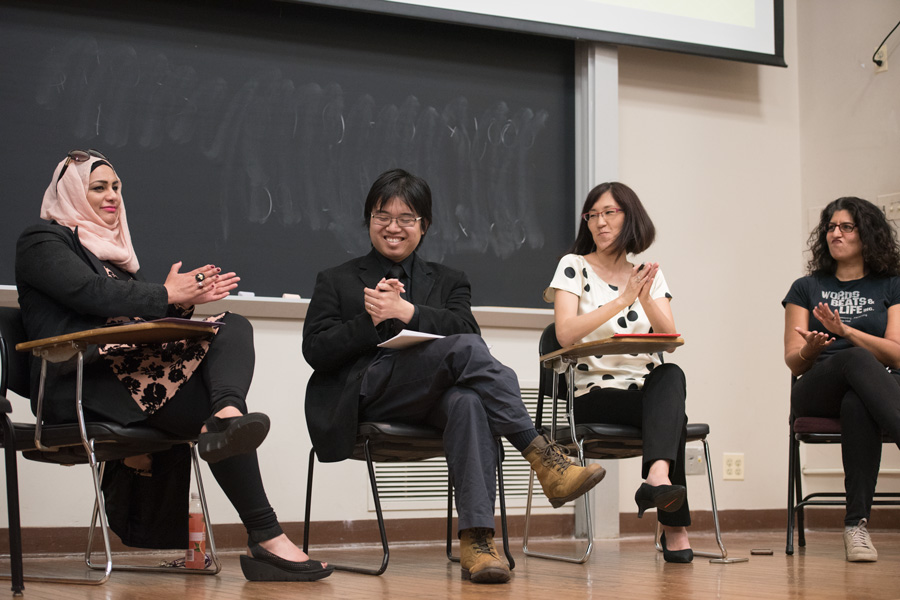Panelists discuss Asian-American political engagement in Trump era
Colin Boyle/Daily Senior Staffer
Panelists speak in Fisk Hall on Monday during event hosted by Asian American studies program and Multicultural Student Affairs. The panelists discussed how Asian Americans can use political engagement to resist oppressive policies in the Trump era.
May 17, 2017
Asian Americans need to push back against media stereotypes and misconceptions that they are politically apathetic by engaging civically, political science Prof. Julie Lee Merseth said during an event Tuesday.
Panelists discussed the impact of the election and President Donald Trump’s administration on Asian-American communities during the event in Fisk Hall. They addressed issues of stereotypes and political participation among Asian Americans in front of about 50 people.
The panel, organized by the Asian American studies and Multicultural Student Affairs, included Merseth, Asian American studies and African American studies Prof. Nitasha Sharma, associate chaplain and director of interfaith engagement Tahera Ahmad and Asian American studies Prof. Justin Tse.
Weinberg senior Diana Fu, who helped organize the event and moderated the panel, said the event was held as a follow-up to “But Where Are You Really From?: A Panel on Being Asian in America,” which was held last year to celebrate Asian Pacific American Heritage Month.
Merseth said Asian-American political engagement is important, calling political resistance one of the only tools citizens have against oppressive practices.
“We need to keep reminding people that, for example, don’t like politics for all sorts of understandable reasons, is that it is the time to engage because the stuff happening in far away Washington is absolutely changing the lives of the people around us in our communities,” she said. “We’re going up against institutions, structures and systemic oppression, so we need collective politics, and we need resistance, not just participation.”
Tse said Asian-American immigrants’ political engagement has transnational implications. Immigrants’ actions in their new country can affect their homeland, he said.
“In that way, transnational political participation is not abdicating political participation in the United States,” Tse said. “Political participation in the United States can very well be connected to political happenings in Korea, in China, in Hong Kong, in Taiwan (and) in India.”
Sharma said although stereotypes of apathetic Asian Americans exist, Asian Americans have historically been activists and continue to fight against xenophobia and racism.
Though people forget about the past due to “historical amnesia,” Sharma said the issues of racism faced by Asian Americans are not new.
Merseth said though people believe progress had been made in equality and social justice, there is still a contemporary mainstreaming of xenophobia. Neighbors, the president and other elected officials have changed the way they speak about issues of oppression, Merseth said.
“People just feel like it’s okay again, and mainly people in positions of power feel like it’s okay to utilize this language and discursivity that feels like such a setback,” she said.
The panelists also discussed the importance of coalition building and the intersection of religion and race for issues that face Muslim-American communities in the Trump presidency.
Merseth said identity plays an important role in Asian-American politics today and must explore how religion factors into race.
“The current political moment is also really calling on us to engage courageously with the relationship between race and religion, and more specifically the role of religion in racialization processes,” she said. “There’s a lot at stake.”
Fu said it was important to hold the panel in the wake of recent political events regarding the Trump administration. The event was organized to help people understand political difficulties Asian Americans encounter, she said.
Communication sophomore Andrew Song said he attended the event because he was interested in learning about his identity.
“I haven’t really talked to anyone about these topics, or anyone older, so I think it’s nice to get a professor’s perspective,” Song said. “We all kind of have a stand on the issue, but I think it was just more learning about my identity.”
Email: [email protected]
Twitter: @_janeyun


